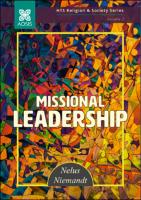Missional Leadership
| dc.contributor.author | Niemandt, Cornelius | |
| dc.date.accessioned | 2020-05-12T08:00:50Z | |
| dc.date.available | 2020-05-12T08:00:50Z | |
| dc.date.issued | 2019 | |
| dc.identifier | ONIX_20200512_9781928523062_10 | |
| dc.identifier.issn | 2617-5819 | |
| dc.identifier.uri | http://library.oapen.org/handle/20.500.12657/37687 | |
| dc.description.abstract | The purpose and aim of this book is to develop an appropriate leadership model for missional churches. This implies a positioning of this book within the broader theology of mission and a consensus on the theology of the Missio Dei, originating at the 1952 conference of the International Missionary Council in Willingen, Germany. In this approach to the theology of mission, mission is understood as the work of the Trinitarian God, and the church is privileged to participate in God’s mission. It is against this background that the growing consensus on missional ecclesiology challenges leadership models developed for a different time and a different kind of church (with less or no emphasis on the missional character of the church). The aim is to reflect theologically on the role of leadership in the missional church. What kind of ideas about power, authority and leadership are appropriate for a missional church? New missional challenges demand new ideas about missional leadership. Church organisation and leadership reflects a theological position – there is a strong relation between ecclesiology and church organisation. The nature of the church provides the framework to understand the character of the church. What the church is determines what the church does. The church organises what it does and agrees on rules that regulate ministries and organisation. Issues such as the way the church organises and governs what it does, and thus church leadership, need to be answered against this background and understanding. Church polity and organisation, as well as leadership, must reflect the identity, calling, life and order of the church. This book, therefore, addresses life in the Trinity, participation in the Missio Dei and contours of the missional church as the point of entry to develop leadership insights. It contributes towards the development of an appropriate model of leadership for missional churches, because although recent developments in the theology of mission comprehensively addressed the area of missional ecclesiology, there is a gap in the development of a leadership model based on the concept of authority in the missional church. | |
| dc.language | English | |
| dc.relation.ispartofseries | HTS Religion & Society Series | |
| dc.subject.classification | thema EDItEUR::Q Philosophy and Religion::QR Religion and beliefs | en_US |
| dc.subject.other | Missional ecclesiology | |
| dc.subject.other | leadership | |
| dc.subject.other | missional leadership | |
| dc.subject.other | discernment | |
| dc.subject.other | church transformation | |
| dc.subject.other | missiology | |
| dc.subject.other | missional church | |
| dc.title | Missional Leadership | |
| dc.type | book | |
| oapen.identifier.doi | 10.4102/aosis.2019.BK108 | |
| oapen.relation.isPublishedBy | d7387d49-5f5c-4cd8-8640-ed0a752627b7 | |
| oapen.series.number | 7 | |
| oapen.pages | 262 | |
| oapen.place.publication | Durbanville |

